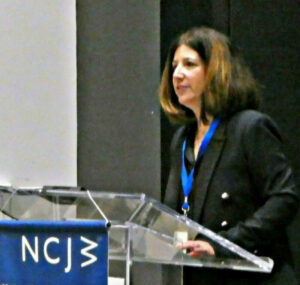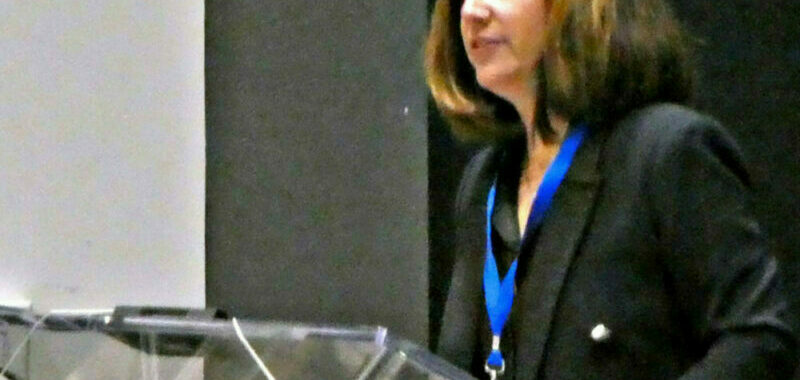By Andrew Adler
Community Editor
Beth Salamon, State Policy Advocate Chair at the Louisville chapter of the National Council of Jewish Women, has been elected to the NCJW’s national board.
Salamon has long and deep experience in community affairs. She joined the Jewish Community Relations Council in 2009, and has chaired the JCRC since July of 2019. An alumna of Temple University’s law school, she’s drawn on her legal background while confronting some of the thorniest public issues of the day.
“Beth Salamon is as strong as new rope,” says JCRC

Beth Salamon addresses guests at this past March’s NCJW Louisville Reproductive Freedom Breakfast at the Trager Family JCC (Photo courtesy of NCJW Louisville)
director Matt Golden. “She is an unbelievably fierce advocate for the Jewish people and, even more importantly, for just causes that impact our community. I also think she has one of the most impressive moral compasses that I have ever seen in anybody; she has an innate ability to know what is the ‘right thing to do’ and isn’t afraid to do it. Our community is lucky to have her and our JCRC is lucky to have her as our Chair.”
In her advocacy role at Louisville NCJW, Salamon tracks the progress of bills in the state general assembly that affect Kentucky women, particularly regarding access to reproductive healthcare. The U.S. Supreme Court’s decision overturning Roe v. Wade – with ramifications extending throughout most of the nation – makes her ascendancy to the national board particularly relevant.
The battlelines are stark. During just the past several weeks, debate has raged over the availability of mifepristone (a.k.a. RU-486) for medicinal abortion. As an island of blue in the ocean of red that is Kentucky, Democratic Louisville has the unenviable task of going up against the overwhelmingly Republican legislature.
“It’s a barrier, but it’s also an opportunity,” Salamon acknowledges. “We have to take what we feel is the right thing to do and find a way to make it work. And you know, not everything about Kentucky is necessarily a negative. I think living in a smaller state, you get opportunities on national boards and things like that.”
Founded in 1893 and now numbering about 180,000 members, NCJW calls itself “the oldest Jewish women’s grassroots organization in the country, continually guided by Jewish values that call on us to improve the lives of the most vulnerable women, children, and families.”
Whether on a local or national level, NCJW focuses its attentions on a portfolio of core issues, affecting women, children and families. Not surprisingly, reproductive freedom tops the list, along with various iterations of healthcare. Beyond those parameters, NCJW grapples with such concerns as immigration, equal pay and paid parental leave, gun violence, supporting the Ukrainian people, and efforts by the Israeli government to weaken its judiciary.
“We rely on Beth’s knowledge of issues – as well as her connections to community leaders, like-minded organizations, and local and state officials – to guide us through NCJW’s advocacy work,” says Nancy Chazen, NCJW Louisville’s executive director. “She is a valuable liaison between the National NCJW office and our office here to lead the policy efforts in Kentucky.”
In terms of priorities, “right now, reproductive rights are first and foremost in my mind,” Salamon says. “And I’m really proud of the fact that NCJW leans into being progressive and Jewish at the same time – it occupies a faith-based space with a different narrative. Choice is definitely one of those areas where I think we can have great impact.”
The Supreme Court’s June 2022 decision in Dobbs v. Jackson Women’s Health Organization – coming almost 50 years after Roe v. Wade codified a constitutional right to abortion – was an undeniable blow. Yet Salamon believes that, taking a long view of law and legislation, it’s still possible to produce meaningful post-Dobbs reforms.
It might be that “strategy-wise, we start saying ‘Okay, this has been 50 years in the making, but maybe we can do the same thing the other side did, which is chip away at the total ban that we have now,’” she says, “and at least see if we can get some common-sense exceptions placed in the law.”
Salamon’s election to the National Board reflects her longtime commitment to moving the needle of significant social change.
“What a wonderful recognition of Beth’s talent and work,” says Sara Klein Wagner, President and CEO of the Jewish Federation of Louisville and the Trager Family JCC. “There is no doubt she will be a significant thinker and participant in setting the national agenda and priorities of the organization. I look forward to seeing the impact.”
There are 58 NCJW sections in the U.S., though much of the activity has centered on areas with larger Jewish populations. Indeed, one of Salamon’s incentives for joining the national board was to help balance its representation.
“I think the national organization is realizing that they need some diversity,” she says. “It’s just my gut feeling about this – I don’t have confirmation on this. But we would go to national board meetings, and in some of the redder states, we’re finding that the national messaging was challenging. So I think they’re trying to broaden their national board perspective.”
“We are thrilled for her, both professionally and personally, to serve on the national NCJW board,” Chazen says, adding that Salamon “will give a voice and perspective on issues in a state that is often challenged in providing social justice, like reproductive freedoms, for women and families. We know she will ‘Kentuckian-ize’ the discussions of these issues to help identify actionable advocacy work in a state like ours.”




